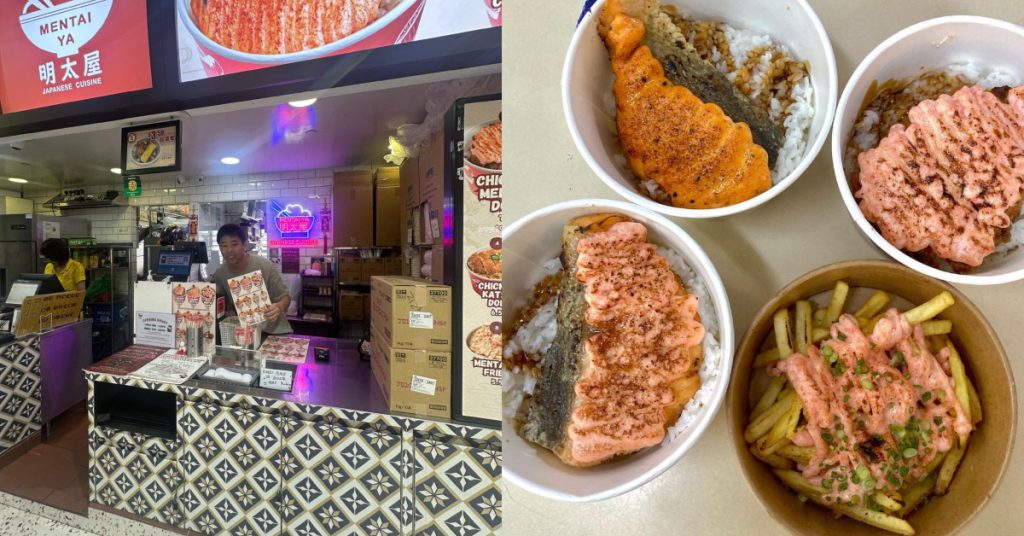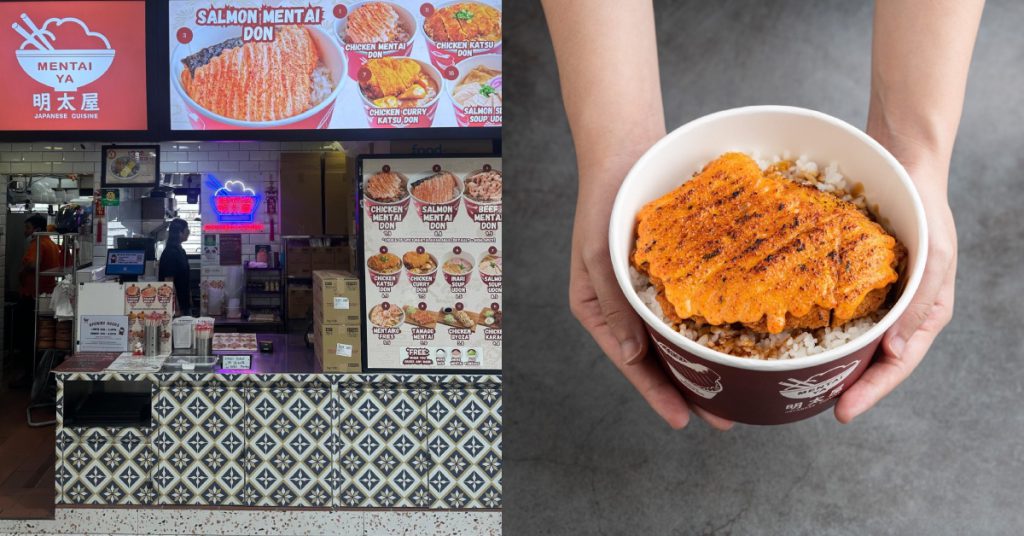When Vulcan Post spoke to Japanese hawker chain Mentai-Ya‘s founder Keat Hwee Khoo last Friday (May 30), he had one blunt piece of advice for aspiring food entrepreneurs: don’t enter the F&B business right now.
Khoo founded Mentai-Ya in 2020, right in the thick of the COVID-19 pandemic, and had managed to expand it to nine outlets across Singapore, all of which are situated in coffee shops. He also delved into the café scene with two concepts: Chirashi-Ai and Coffee and Chirashi.
However, like many in the industry, his businesses struggled under the weight of rising ingredient costs, steep rental, GST hikes, and mounting labour expenses.
After nearly six years in operation, these challenges ultimately forced Khoo to gradually shut down all of his outlets over time.
Khoo’s ventures are among the many casualties in the ongoing wave of F&B closures in recent months. According to the Business Times, the average number of F&B business closures surpassed 300 per month in the first quarter of this year. And in 2024, it hit a 20-year high, at 3,047.
In our conversation with Khoo, he shared candid insights into his F&B journey, the challenges that led to his exit, and his plans for the future.
Escalating coffee shop rentals
 Image Credit: Mentai-Ya via Facebook
Image Credit: Mentai-Ya via FacebookDespite being well-received in its early days, escalating rental costs emerged as a major obstacle for Mentai-Ya over time.
Since starting his businesses, Khoo claimed that coffee shop rental prices have skyrocketed, with rates now starting at a minimum of S$5,000 to S$6,000 per month. “There [are] no more [coffee shops] with S$2,000 or S$3,000 rentals.”
He lamented that F&B business owners like himself are often unable to generate enough revenue to cover these soaring costs.
 Image Credit: Mentai-Ya
Image Credit: Mentai-YaAt privately owned coffee shops, rental prices are set by landlords with no governmental control, and they can vary drastically based on location.
Khoo shared that among all his outlets, his Tampines location had the highest rental, with a rate between 10% and 20% higher than his other stalls.
But what’s driving the high-rent environment?
According to a CNA report, industry observers attribute the skyrocketing sale prices of coffee shops as a key factor. In recent years, three coffee shops in Yishun, Tampines, and Serangoon were sold for at least S$40 million each.
These eye-watering transactions could have led landlords to justify charging steep rental fees, in a bid to recoup their investments and turn a profit—leading to more calls for government regulation of coffee shop stall rentals.
Currently, there are a total of 776 coffee shops in Singapore, with 402 of them privately owned. The remaining 374 are publicly owned, of which 97% have had their rental prices unchanged by the government over the past five years.
During a parliamentary session in 2024, Workers’ Party member Jamus Lim asked whether the government would consider re-acquiring privately owned coffee shops under HDB to better control rental prices.
However, Senior Minister of State for National Development, Sim Ann, stated that these coffee shops operate in an open market, where the government cannot directly intervene in rental prices set by landlords.
Labour costs & strict hiring quotas
 Image Credit: Mentai-Ya via Facebook
Image Credit: Mentai-Ya via FacebookApart from rental costs, another key challenge Khoo faced was the high expenses of manpower—both of which, he said, constitute the bulk of operating expenses and are the main reasons F&B businesses struggle to achieve meaningful profit margins.
Khoo estimated that each employee cost him around S$4,000 to S$5,000 per month, and the strict hiring quotas for foreign workers further complicated the staffing process.
Based on the Ministry of Manpower (MOM) website, the maximum quota for hiring foreign workers in the service sector is 35% of the total workforce.
This means that for every foreign worker employed on a Work Permit or S Pass, two Singaporeans or Permanent Residents must be hired—something Khoo lamented as a significant operational challenge.
Moreover, as the number of foreign workers hired increases, so does the monthly levy imposed by the government. The levy starts at S$450 per worker and rises as the foreign worker ratio approaches the 35% quota.
Khoo added that the foreign workers he employed have voiced growing concerns about living and working conditions in Singapore, particularly the steep increase in housing rental costs. As a result, many are now demanding higher wages than before.
The minimum basic wage for Malaysian foreigners used to be S$1,800 to S$2,000, but has since increased to an expected salary of at least S$2,500, he pointed out.
Increasing supply costs
Hawkers like Khoo were also hit hard when the GST rate rose from 7% to 8% in 2023, and from 8% to 9% in 2024.
“When GST increased in 2023, our costs increased, from 35% to 40% [in 2023] to over 40% [in 2024]”, Khoo lamented.
 Image Credit: Mentai-Ya via Facebook
Image Credit: Mentai-Ya via FacebookAt the same time, global crises had also further strained his businesses, affecting sales across his coffee shop and cafe concepts.
Initially, Khoo and his team attempted to mitigate high supply costs by increasing Mentai-Ya’s food prices, but this only resulted in lower foot traffic.
Khoo wasn’t alone in raising prices—according to the Singapore Department of Statistics (SingStat) in May 2024, hawker food prices increased by 6.1% in 2023, the highest since 2008, partly due to higher supply costs.
He then lowered prices and attempted to streamline operational costs by reducing waste and exploring new methods to improve efficiency, but despite these efforts, his efforts ultimately bore no fruit.
Although Mentai-Ya’s sales improved by 30% to 40% during the last few months of its operation, as it ramped up its social media marketing, the business’s profit margins remained low at only a few thousand dollars.
A “vicious cycle”
For Khoo and many other hawkers, structural challenges like foreign worker quotas, rising wage demands, and steep rental costs have created a “vicious cycle” of high expenses and low profits.
And in such an environment, sustaining a coffee shop business feels increasingly like an uphill battle.
Here is a breakdown of the costs Mentai-Ya faced, according to Khoo:
| Rental prices | S$5,000 to S$8,000 per outlet – with min. 10% to 20% increase between 2023 and 2024 |
| Raw ingredients supply costs | Increased by – 2023: 30% to 40% – 2024: over 40% |
| Labour costs | ~S$4,000 per employee |
| Administrative costs (marketing, hiring, etc.) | ~S$6,000 across all outlets |
“(The hawker scene now) makes people want to [leave] to earn more money, and it doesn’t justify one to be a hawker anymore,” Khoo reflected.
He shared a story about a fellow hawker who used to run a Western food stall, bringing around S$3,000 to S$4,000 each month while working seven days a week. Eventually, his friend left the stall behind and joined a catering company, where he now draws a monthly salary of over S$5,000 with a 5.5-day workweek.
Looking into the future, Khoo believes that the trend of F&B closures will only continue if measures are not put in place to help coffee shop owners mitigate the ever-increasing rent in the current open-market tender system.
He had lost more than S$550,000 in the last two years from 2023 until the final closure of his last stall in April 2025.
When asked whether he has plans to return to F&B, Khoo shared that unless the structural issues in the F&B scene improve, he will likely make his departure from the food business permanent.
Unless you are a landlord (or someone with lots of money), or have an addictive food concept to mitigate the high costs of running a coffee shop store, I foresee at least 80% of F&B businesses in coffee shops to close down in the near future if they’re not already landlords in the hawker centre and coffee shop scenes.
Keat Hwee Khoo, founder of Mentai-Ya- Read other related articles written on Singaporean startups here.
Featured Image Credit: Mentai-Ya

.jpg) 6 hours ago
3
6 hours ago
3
 English (US)
English (US)